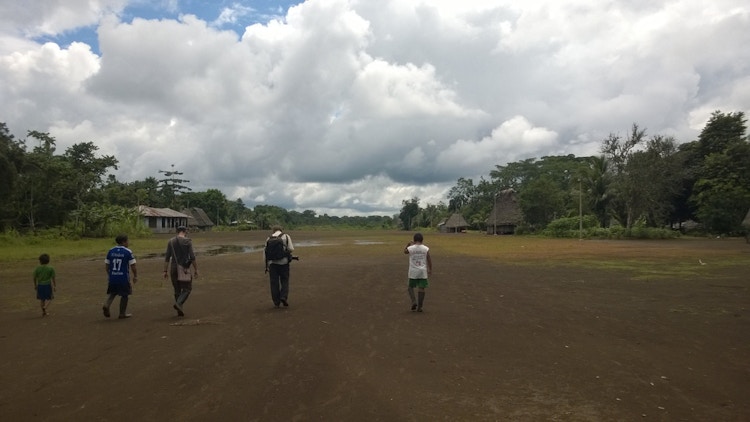Indigenous victory in Peru:
Wampis and Achuar Peoples halt oil project in Amazon rainforest
Thanks to immense opposition from Indigenous Peoples in the Peruvian Amazon, no companies want to get involved in Petroperu’s attempts to establish oil production in Indigenous territories.

PERU: The Achuar (pictured) and Wampis have resisted the development of oil block 64 for three decades. Photo: Thomas Johansen
By Rainforest Foundation Norway.
In a significant triumph for Indigenous rights and environmental conservation, the Wampis and Achuar nations of the Peruvian Amazon have again successfully halted oil exploration in Block 64, a contested area overlapping their ancestral territories.
“We have never welcomed the oil companies into our territories. We want to protect our territories, not pollute them. With the support of our allies, we have presented our demands regarding the elimination of the oil block in different entities,” says Elmer Kunchim, President of FENAP, the representative organization of the Achuar people.
The Peruvian state oil company Petroperu, which currently holds a 100% share of the oil block, ran an open tender process to find a partner to operate the contested oil concession. Last week, they announced that the tender failed to attract bids.
“This lack of interest from companies is a testament to the power of organized opposition. The Indigenous Nations have maintained their internal unity to resist oil production on their ancestral territories, despite immense outside pressure,” says Stefan Kistler, Senior Adviser at Rainforest Foundation Norway.
Three decades of opposition
Block 64, located in the Loreto region, has been a focal point of Indigenous opposition since its creation in 1995. The Wampis and Achuar peoples have long opposed oil development in the area due to environmental and human rights concerns.
Just east of the Achuar territory, across the Pastaza River, is another oil concession area, Lot 192. This is one of the largest and oldest oil concessions in Peru, and for nearly five decades it has adversely affected the Indigenous Quechua, Achuar, and Kichwa communities .
Between 2000 and 2019 alone, 155 oil spills were registered in Block 192, and official sources validated at least 1199 sites environmentally impacted within the concession area. This November, an oil spill caused severe damage on Achuar territory. Several deaths have been attributed to the pollution from the spill, a brutal reminder of what is at stake.
Besides the oil spills that occurred in the territories of the Wampis and Achuar along the North Peruvian oil pipeline, they have seen firsthand the severe environmental contamination and the socio-cultural impact that five decades of oil activity have left their Indigenous neighbours.
RFN has supported the Achuar and Wampis people for more than a decade to strengthen their self-governance and sustainable management of their territories. This has been done through support to their representative institutions and key activities, such as community assemblies and the development and implementation of resource management plans.
“Despite Petroperu’s claims of local support, consultation, and community approval for the development of the oil block, the Achuar and Wampis’ position is and has been clear and steadfast for decades”, says Kistler.
“Constant attempts have been made to gain local support for the oil block. Outside interventions aimed at dividing communities have continuously tried to undermine Indigenous institutionality. Despite this, the Achuar and Wampis Nations have always firmly maintained their position of not allowing oil companies to work on their ancestral lands.”

LORETO: In Loreto, Peru, the Achuar are fighting to keep their territory clean from oil spills. Photo: Thomas Johansen
How many more?
This is not the first victory for the Indigenous communities in preventing the development of Block 64. Several previous operators have intended to exploit crude oil from this remote Amazon region, yet they all withdrew.
While other issues might have factored in, the strong opposition and pushback from the Achuar and Wampis have played a crucial role in halting oil exploitation. The latest example is the Chilean oil company GeoPark, which withdrew from Block 64 in 2020, following years of protests, lawsuits, and international advocacy led by the Wampis and Achuar people. The Indigenous communities launched a global campaign called “Atsá Geoparkka” (No to GeoPark) and filed legal actions to defend their territories.
The establishment of the oil block has never been consulted with the indigenous inhabitants whose area it superposes, but have been steadfast and united in their opposition ever since. Prior consultation of interventions that impact an Indigenous community is a right firmly established by international law, such as the ILO Convention 169, recognizing Indigenous Peoples' rights to land and natural resources in their territories. Peru ratified the convention in 1994, before Block 64 was established, making it legally binding.
The fight is not over
Petroperu has announced that they are proceeding to negotiate directly with oil companies to secure production deals for Block 64.
The Wampis and Achuar continue to demand the definitive cancellation of the oil project and the annulment of Block 64 to prevent future attempts at oil exploitation in their territories. They remain vigilant of Petroperu’s subsequent dealings.
“The Achuar people will continue to fight for our demands, and we will not allow oil companies in our territory,” Kunchim concludes.

Stefan Kistler
Senior MEL Adviser, Peru and Colombia Program
stefan@rainforest.no

Mayu Velasco Anderson
Head of the Peru and Colombia Programme
mayu@rainforest.no